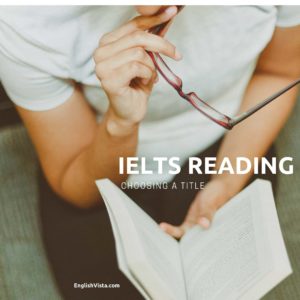
The ‘Choosing A Title’ question regularly appears in the IELTS reading paper. The purpose of this question is to determine a students’ understanding of the ‘big idea’ of a text. Students are required to select a title, that is the most appropriate for the whole passage, from a list of titles that are provided.
The skills involved in this test include:
- Students identifying the ‘big idea’ in a passage
- Students successfully recognising the differences between details and main ideas
In order to be successful in this test, follow our top tips for ‘Choosing A Title’ tasks:
- Read through the whole passage.
- Pay close attention to the opening and closing paragraphs to ensure you fully understand the ‘big idea’ of the text.
- Read through the possible titles and identify which are only relevant to certain parts or paragraphs in the text.
- Remember that all of the title options will be relevant to a part of the text – the skill needed is for you to pick the one that is representative of the whole passage, not just a part of it.
- Don’t waste time! This question is only worth one point so do not spend too long on it.
Difficulty Level: Medium
This is a slightly shorter text with an easier content. There is some more complex vocabulary but these words are repeated throughout the text, lowering the overall number of difficult vocabulary.
Reading Passage
We tend to think of sleep as a time when the mind and body shut down. But this is not the case; sleep is an active period in which a lot of important processing, restoration, and strengthening occurs. Exactly how this happens and why our bodies are programmed for such a long period of slumber is still somewhat of a mystery. But scientists do understand some of sleep’s critical functions, and the reasons we need it for optimal health and wellbeing.
One of the vital roles of sleep is to help us solidify and consolidate memories. As we go about our day, our brains take in an incredible amount of information. Rather than being directly logged and recorded, however, these facts and experiences first need to be processed and stored; and many of these steps happen while we sleep. Overnight, bits and pieces of information are transferred from more tentative, short-term memory to stronger, long-term memory—a process called “consolidation.” Researchers have also shown that after people sleep, they tend to retain information and perform better on memory tasks. Our bodies all require long periods of sleep in order to restore and rejuvenate, to grow muscle, repair tissue, and synthesize hormones.
Healthy sleep is critical for everyone, since we all need to retain information and learn skills to thrive in life. But this is likely part of the reason children—who acquire language, social, and motor skills at a breathtaking pace throughout their development—need more sleep than adults. While adults need 7-9 hours of sleep per night, one-year-olds need roughly 11 to 14 hours, school age children between 9 and 11, and teenagers between 8 and 10. During these critical periods of growth and learning, younger people need a heavy dose of slumber for optimal development and alertness.
Source: https://www.sleepfoundation.org/articles
Question: Select the best title for this passage from the list of titles below (A-D).
- How Much Sleep Do We Need?
- What Is A Good Night’s Sleep?
- The Importance of Sleep for Young People
- Why Do We Need Sleep?
Key Vocabulary:
restoration: the act of returning something to its original condition (making it new again)
occurs: happens
slumber: sleep
optimal: the best, most favourable
solidify: to make stronger, to reinforce
consolidate: to combine into a single, more effective, whole
retain: continue to have something
thrive: to prosper, to flourish
acquire: to get
ANSWER
D.
Title A ‘How Much Sleep Do We Need’ is mostly discussed only in the third paragraph. This title does not refer to the big idea of the whole text.
Title B ‘What Is A Good Night’s Sleep’ is not really focused on in this article. It doesn’t specifically state what determines a good night’s sleep, apart from the reference to length of sleep in paragraph 3.
Title C ‘The Importance of Sleep for Young People’ is discussed in depth in the third paragraph but does not refer to the big idea of the whole text.
